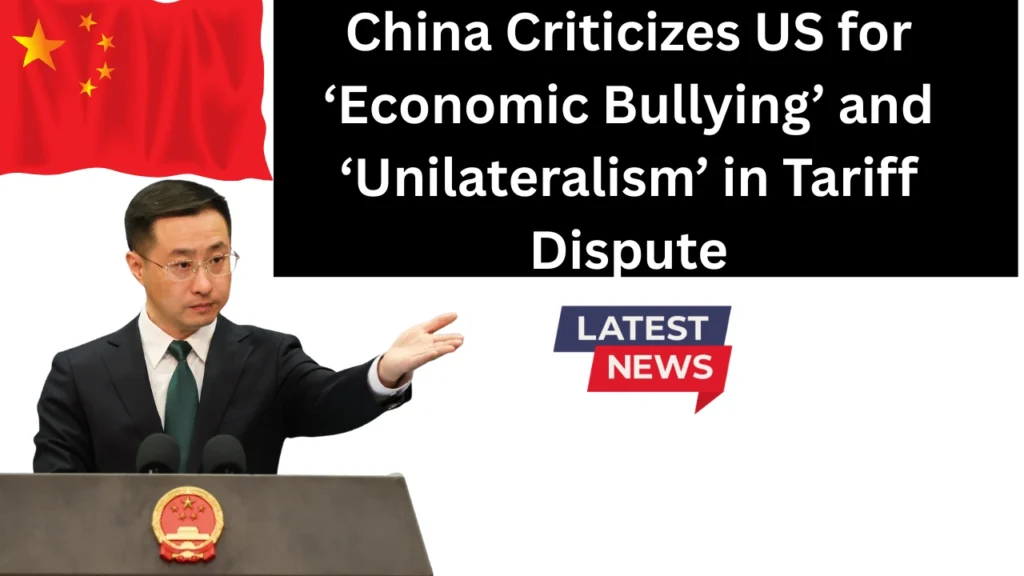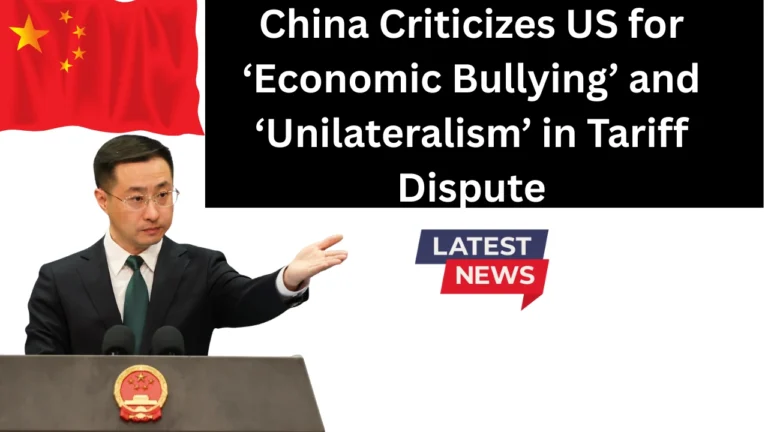In a recent development, China has strongly criticized the United States for its tariff policies, accusing Washington of engaging in “economic bullying”, “unilateralism”, and “protectionism”. China’s Foreign Affairs spokesperson, Lin Jian, expressed deep concern over the negative consequences of these actions, particularly for the global economic recovery. This issue has become a central point of tension between the two nations, further escalating the ongoing trade war.

During a press conference on Monday, Lin Jian pointed out that the US has repeatedly prioritized its own interests at the expense of global economic stability, especially by adopting a policy of “America First”. She stressed that such actions undermine international trade rules and harm not only China but also the Global South and developing nations that depend on fair trade practices.
🚨🇺🇸 🇨🇳 BREAKING: China accuses US of unilateralism, protectionism and economic bullying with tariffs pic.twitter.com/QANnyo6DNL
— Jackson Hinkle 🇺🇸 (@jacksonhinklle) April 7, 2025
China’s Allegations of Economic Bullying
Lin Jian made it clear that the US’s approach to global trade has shifted drastically under the current administration. According to her, the “America First” strategy, particularly the reciprocal tariffs imposed by the US, harms global production stability and the functioning of global supply chains. Lin added, “This policy seriously impacts the world’s economic recovery, which is already fragile after the pandemic.”
China argues that these policies are not just an inconvenience but a direct assault on the rights of other nations, especially developing countries in the Global South. Many of these nations rely heavily on trade with the US and China and are at risk of being caught in the crossfire of these tariff escalations. For China, these tariffs are not just a challenge to its own economy, but to the economic development of a much broader international community.
“The abuse of tariffs by the United States is tantamount to depriving countries, especially those in the Global South, of their right to development,” Lin Jian said, emphasizing the importance of upholding international trade rules.
The Escalating Tariff War Between China and the US
The tariff war between China and the United States has escalated in recent months, with both countries imposing steep tariffs on each other’s goods. President Donald Trump recently introduced a 34% tariff on Chinese goods, in addition to the 10% tariffs announced earlier this year in February and March 2025. This has brought the total tariffs imposed on China to 54%.
In response, China has implemented its own retaliatory tariffs on US goods, also setting the rate at 34%. This back-and-forth escalation has led to growing fears that the trade war could have long-lasting consequences on both global markets and the stability of the international economy.
Despite the tariff increase, China’s state-run media, including the People’s Daily, remains optimistic about the country’s resilience in the face of the high tariff rates. They emphasized that despite market downturns in major cities like Beijing and Shanghai, China has the tools and strategies to weather the storm.
“The sky won’t fall. Faced with the indiscriminate punches of US taxes, we know what we are doing, and we have tools at our disposal,” the People’s Daily stated confidently, indicating that China will not be easily swayed by these tactics.
China’s Strong Reactions
Despite facing economic pressure, China remains steadfast in its determination to safeguard its legitimate rights and interests. Foreign Affairs spokesperson Lin Jian reiterated, “Pressure and threats are not the way to deal with China.” She emphasized that China would continue to take necessary steps to protect its economy and would not back down from asserting its position in this ongoing dispute.
In another sign of China’s resolve, the country’s Vice Minister of Commerce, Ling Ji, met with 20 American companies over the weekend. The meeting, which included representatives from well-known businesses such as Tesla and GE Healthcare, provided a platform for China to voice its concerns directly to the US business community.
Ling Ji stated, “The root of the tariff problem lies in the US. We hope that American companies can address the issue at its root and take concrete actions to safeguard the stability of the global supply chain.” The involvement of American businesses suggests that the economic impact of the tariff dispute is being felt not only by China but by the US business community as well.
China’s Appeal for Multilateralism in Global Trade
China’s criticism of the US is not just a defense of its own economic interests but also a call for a return to multilateralism in global trade. The Chinese government has urged all countries to uphold the principles of genuine multilateralism, working together to protect the global trading system from unilateral actions by any one nation.
By emphasizing the importance of international cooperation, China is positioning itself as a defender of the rules-based global trade system, which it believes is essential for the prosperity of nations around the world. The rise of unilateralism in trade relations, according to China, is a threat to the economic development of emerging markets and developing nations, which rely on a stable and fair trading environment.
Impact of the Tariff War on Global Economy
The ongoing tariff dispute between the US and China is more than just a bilateral issue; it has significant implications for the global economy. Global supply chains have already been disrupted, and the rising cost of goods due to higher tariffs has made it harder for businesses to maintain their margins. Many economists fear that this trade war could lead to reduced global trade, lower economic growth, and increased inflation in countries heavily dependent on imports.
The imposition of tariffs, particularly on key sectors like electronics, machinery, and steel, has also raised concerns in the Global South, where many countries rely on affordable imports from both the US and China. The tariffs not only increase costs for consumers but also make it more difficult for developing countries to participate in the global economy on fair terms.
China’s Strategy for Handling the Trade War
As tensions continue to rise, China has shown that it is prepared to counterbalance the impact of tariffs through strategic measures. China’s response has been a combination of retaliatory tariffs, efforts to strengthen domestic production, and calls for greater global cooperation. The Chinese government is committed to protecting its economic interests and ensuring that the country’s growth trajectory is not derailed by external pressures.
China’s economic resilience will be tested in the coming months, especially as global oil prices and other external factors continue to fluctuate. The ultimate outcome of the US-China trade war will depend on how both countries navigate the complex dynamics of global trade, supply chain disruptions, and the shifting balance of power in the world economy.
Conclusion
The escalating tariff dispute between the US and China has reached a critical point, with both countries taking strong positions to safeguard their economic interests. China has accused the US of economic bullying and unilateralism, stressing that these actions are not only harmful to its own economy but also to the broader global economy. As both nations continue to retaliate with tariffs and trade barriers, the long-term effects on international trade, supply chains, and global economic recovery remain uncertain.
China’s call for multilateralism and a return to global cooperation highlights its commitment to a more inclusive and fair trading system. As the situation develops, all eyes will be on how both nations navigate this challenging trade war and whether they can find common ground to resolve their differences. The outcome of this dispute will have far-reaching implications for global markets, economic growth, and the future of international trade.

